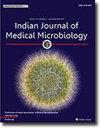Development and evaluation of real-time recombinase polymerase amplification assay for fast identification of Rhizopus arrhizus
IF 1.4
4区 医学
Q4 IMMUNOLOGY
引用次数: 0
Abstract
Purpose
Timely diagnosis of mucormycosis is challenging as the disease is rare and confusing to laboratory physicians without experience or expertise. Molecular tools like real-time PCR have been developed to diagnose mucormycosis and can circumvent these issues. However, their use requires an expensive thermocycler. Hence, there is a need for an alternative rapid, sensitive, and specific low-cost molecular test. Here, we developed and evaluated a real-time recombinase polymerase amplification (RPA) based test for detection of R. arrhizus, the principal cause of mucormycosis in patient samples with and without COVID-19 associated mucormycosis.
Methods
Primers and probes targeting Rhizopus arrhizus for RPA-based assay were designed using PrimedRPA and screened per the manufacturer's guidelines. DNA from 40 clinically relevant bacteria and molds were used to determine the analytical specificity of the assay, and probit regression analysis using plasmid DNA standards were used to determine the analytical sensitivity of the assay. The developed assay was evaluated on 110 tissue samples from patients with suspected mucormycosis.
Results
The developed assay was able to detect 9 mucorales viz. R. arrhizus, R. microsporus, R. stolonifer, R. homothallicus, S. racemosum, M. indicus, M. circinelloides, A. variabilis and Cunninghamella spp. and did not cross-react with the remaining 31 molds or bacteria. Its limit of detection at 95 % probability was 18.58 copies. The test demonstrated a sensitivity of 96 % (95 % CI: 86.3 %–99.5 %) and specificity of 95 % (95 % CI: 86.1 %–98.9 %).
Conclusion
The developed RPA assay for R. arrhizus demonstrates high diagnostic sensitivity(96 %), specificity(95 %), and low detection limit(18.58 copies). While initial testing using stored unfixed tissue showed promise, comprehensive clinical validation studies are needed to establish the assay's diagnostic utility across diverse clinical settings and specimen types.
实时重组酶扩增快速鉴定方法的建立与评价
目的毛霉病是一种罕见的疾病,对于缺乏经验和专业知识的实验室医生来说,及时诊断是一项挑战。像实时聚合酶链反应(real-time PCR)这样的分子工具已经被开发出来用于诊断毛霉病,并且可以避免这些问题。然而,它们的使用需要一个昂贵的热循环器。因此,需要一种快速、灵敏、特异性低成本的分子检测方法。在这里,我们开发并评估了一种基于实时重组酶聚合酶扩增(RPA)的检测方法,用于检测有或没有COVID-19相关毛霉病的患者样本中引起毛霉病的主要原因——野根霉。方法采用PrimedRPA软件设计以阿根霉为靶点的rpa检测引物和探针,并根据产品说明书进行筛选。使用40种临床相关细菌和霉菌的DNA来确定该方法的分析特异性,并使用质粒DNA标准品进行概率回归分析来确定该方法的分析灵敏度。对110例疑似毛霉病患者的组织样本进行了评估。结果该方法能检出9种霉菌,分别为根霉、小孢子霉、匍生霉、同型霉、总形霉、indicus、circinelloides、变异霉和Cunninghamella等,与其余31种霉菌或细菌无交叉反应。其95%概率的检出限为18.58份。该试验的灵敏度为96% (95% CI: 86.3% - 99.5%),特异性为95% (95% CI: 86.1% - 98.9%)。结论所建立的RPA检测方法具有较高的诊断灵敏度(96%)、特异度(95%)和较低的检出限(18.58份)。虽然使用储存的非固定组织进行的初步测试显示出希望,但需要进行全面的临床验证研究,以确定该方法在不同临床环境和标本类型中的诊断效用。
本文章由计算机程序翻译,如有差异,请以英文原文为准。
求助全文
约1分钟内获得全文
求助全文
来源期刊

Indian Journal of Medical Microbiology
IMMUNOLOGY-
CiteScore
2.20
自引率
0.00%
发文量
154
审稿时长
73 days
期刊介绍:
Manuscripts of high standard in the form of original research, multicentric studies, meta analysis, are accepted. Current reports can be submitted as brief communications. Case reports must include review of current literature, clinical details, outcome and follow up. Letters to the editor must be a comment on or pertain to a manuscript already published in the IJMM or in relation to preliminary communication of a larger study.
Review articles, Special Articles or Guest Editorials are accepted on invitation.
 求助内容:
求助内容: 应助结果提醒方式:
应助结果提醒方式:


